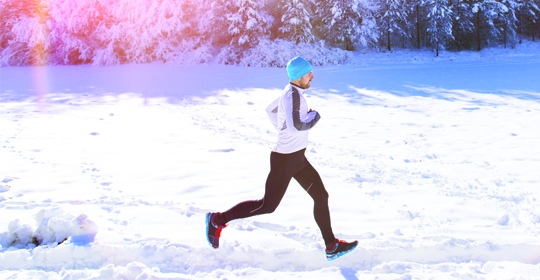Winter workout tips and benefits
 Can exercise make you more resistant to common infections, such as colds? Do you need to take certain precautions when working out in winter weather? Here are the answers to these questions.
Can exercise make you more resistant to common infections, such as colds? Do you need to take certain precautions when working out in winter weather? Here are the answers to these questions.
Benefits
A US study conducted in 2010 over a 12-week period among 1002 participants aged 18 to 85, including 60 percent women and 40 percent men, found that exercise (e.g. walking, swimming or other aerobic activities) practised on a regular basis – about 5 days a week – helps significantly curb the frequency of colds and the intensity of cold symptoms.
People who exercised almost every day experienced 43 percent fewer days with cold symptoms compared to those physically active only 1 day a week or less. The severity of symptoms also fell by 45 percent among the fittest participants.
This benefit is attributed to the fact that intense physical activity temporarily stimulates the immune system, boosting the circulation of infection-fighting immune cells around the body.
There is a catch, however: overtraining has the opposite effect! It uses a significant amount of energy, making the body more vulnerable to viruses.
Tips
Working out despite the snow and cold is possible. To make it enjoyable, you just need to be well prepared. Here are a few helpful tips:
- Dress appropriately: Dress in layers to help protect your upper body and vital organs from the cold.
Layer 1 = Quick-drying material to wick away perspiration.
Layer 2 = Insulating material that “breathes.”
Layer 3 = Lightweight, waterproof windbreaker that allows moisture (e.g. perspiration) to escape.
For the lower body, lightweight tights or pants made of nylon or polyester are a good choice for adequate protection against the cold. - Remember fingers and toes. Wear socks that will keep your feet warm and dry (e.g. wool or synthetic fibres), lined leather gloves or mittens and a headband, tuque or hood.
- Wear waterproof shoes with non-skid soles.
- Stay hydrated. Even during a winter workout, you need to drink before and after exercise to stay well hydrated.
- Cover your nose and mouth, if you have asthma. This will help you avoid an attack.
To prevent the risk of injury when jogging outdoors in winter, shorten your stride and decrease your pace. You should also choose flat terrain and a looped course of a few kilometres only. By running past the same places, you will get to know the slippery spots.
Have a plan B! If you injure yourself during an outdoor workout, make sure you have another way to get home (e.g. taxi, public transit). Plus, on days when the temperature drops to -20°C, consider exercising inside to avoid the risk of frostbite.
Pharmacy services
Do you have questions on how to best prevent a cold or treat its symptoms effectively if they arise? Talk to your family pharmacist for sound advice!
The pharmacy services presented in this section are offered by pharmacist owners who are affiliated with Uniprix. The pharmacists are solely responsible for the professional activities carried out during the practice of pharmacy. These services are offered in participating pharmacies only. Certain fees and conditions may apply.
* The information contained herein is provided for informational purposes only and is not intended to provide complete information on the subject matter or to replace the advice of a health professional. This information does not constitute medical consultation, diagnosis or opinion and should not be interpreted as such. Please consult your health care provider if you have any questions about your health, medications or treatment.
